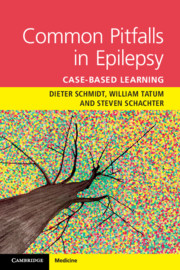Book contents
- Half title page
- Common Pitfalls in Epilepsy
- Copyright page
- Dedication
- Contents
- Preface
- Acknowledgments
- Chapter 1 Mistaking Nonepileptic Events for Epilepsy
- Chapter 2 Mistaking EEG Changes for Epilepsy
- Chapter 3 Radiographic Errors in Epilepsy
- Chapter 4 The First Seizure: Is It Epilepsy?
- Chapter 5 Errors in the Diagnosis of Seizure Types and Epilepsy Syndromes
- Chapter 6 When to Start Treatment?
- Chapter 7 Which Drug is Best?
- Chapter 8 How to Optimize Treatment and What can Go Wrong?
- Chapter 9 What to Do If Drugs Don't Work?
- Chapter 10 How to Avoid Management Errors
- Chapter 11 When to Stop Treatment?
- Chapter 12 Women with Epilepsy
- Chapter 13 Management of Psychiatric Issues in Epilepsy
- Chapter 14 Management of Emergencies in Epilepsy
- Chapter 15 Management of Social Issues
- Index
- References
Chapter 11 - When to Stop Treatment?
Published online by Cambridge University Press: 22 May 2018
- Half title page
- Common Pitfalls in Epilepsy
- Copyright page
- Dedication
- Contents
- Preface
- Acknowledgments
- Chapter 1 Mistaking Nonepileptic Events for Epilepsy
- Chapter 2 Mistaking EEG Changes for Epilepsy
- Chapter 3 Radiographic Errors in Epilepsy
- Chapter 4 The First Seizure: Is It Epilepsy?
- Chapter 5 Errors in the Diagnosis of Seizure Types and Epilepsy Syndromes
- Chapter 6 When to Start Treatment?
- Chapter 7 Which Drug is Best?
- Chapter 8 How to Optimize Treatment and What can Go Wrong?
- Chapter 9 What to Do If Drugs Don't Work?
- Chapter 10 How to Avoid Management Errors
- Chapter 11 When to Stop Treatment?
- Chapter 12 Women with Epilepsy
- Chapter 13 Management of Psychiatric Issues in Epilepsy
- Chapter 14 Management of Emergencies in Epilepsy
- Chapter 15 Management of Social Issues
- Index
- References
- Type
- Chapter
- Information
- Common Pitfalls in EpilepsyCase-Based Learning, pp. 175 - 188Publisher: Cambridge University PressPrint publication year: 2018



